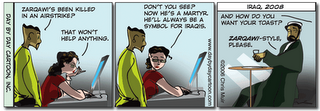Here's what the prescient Andy McCarthy, National Review's judicial guru, had to say this am before the decision came down:
Unfortunately, I'm going to be out-of-pocket for most of today, so I'll miss a lot of the post-mortem if the decision comes down. For pre-mortem, though, I've been poking around, and it seems like there's a prevailing view that if — as expected — the decision comes out in favor of Hamdan, the theory will be that al Qaeda does have Geneva Convention protections.
Make no mistake: if this happens, the Supreme Court will have dictated that we now have a treaty with al Qaeda — which no President, no Senate, and no vote of the American people would ever countenance. The Constitution consigns treaty-making to the political branches, not the courts, but a conclusion that Geneva protects Hamdan (and, by extension, his fellow savages) would ominously mean that the courts, under the conveniently malleable guise of "customary international law" can rewrite treaties to mean whatever they like them to mean.
It is likely that such a theory will not rest on a claim that terrorists qualify as honorable prisoners of war under the conventions. It is too obvious that this is not the case. Rather, it would be premised on the theory that Common Article 3 applies. Article 3 (which is "common" because it applies to all of the Geneva Conventions) prohibits "the passing of sentences and the carrying out of executions without previous judgment pronounced by a regularly constituted court, affording all the judicial guarantees which are recognized as indispensable by civilized peoples." (Emphasis added, and explained below.)
The president, properly, has indicated that Common Article 3 does not apply to our war with al Qaeda because it applies, as relevant here, only to an "armed conflict not of an international character occurring in the territory of one of the High Contracting Parties." POTUS reasons that our conflict is international because al Qaeda is an international terrorist organization and the war is not limited to Afghanistan. However, some claim the war is limited to Afghanistan (notwithstanding, for example, the Twin Towers used to stand in Manhattan, not Kabul), and that a conflict with al Qaeda cannot be "international" because al Qaeda is not a nation.
Nevertheless, even granting that the president is right, internationalist activists (law professors, UN and Euro-bureaucrats, and self-styled human rights organizations) argue that Common Article 3 applies anyway, despite the literal limitations on it in the Geneva Conventions themselves, because it has somehow transmogrified into binding "customary international law." (For those interested, I wrote an article called "International Law v. the United States" for Commentary's February 2006 edition. It addresses how customary international law undermines American democratic self-determination.)
If this reasoning is used to apply Geneva, and thus strike a treaty with al Qaeda (one which obligates only the U.S. — al Qaeda can be expected to go on bombing civilians and torturing and beheading prisoners), who knows what combatant trials will look like? Notice the Article 3 language I have highlighted three paragraphs above. It will be the courts, ultimately, which decide what is "a regularly constituted court," and what "judicial guarantees" are "indispensible" according to "civilized people."
Anyone want to bet against me that this won't come to mean criminal trials with virtually all the protections required to be given to U.S. citizens under the Constitution?
